Program Leadership
Ayesha Shajahan-Haq, Ph.D.
Program Director, M.S. in Tumor Biology
New Research Building, Room E404
(202) 687-2157
ans33@georgetown.edu
Michael D. Johnson, Ph.D.
Program Director, Ph.D. in Tumor Biology
New Research Building, Room W416
(202) 687-0217
Michael.Johnson@georgetown.edu
Isabel Huerta, MHS
Program Coordinator, Tumor Biology
New Research Building, Room W417A
(202) 687-3039
TumorBiology@georgetown.edu
Faculty
Faculty in the Tumor Biology Training Program are members of the Lombardi Comprehensive Cancer Center (LCCC) at Georgetown University. LCCC members are aligned with one of the four research programs within the Cancer Center – the Breast Cancer Research Program, Molecular Oncology Research Program, Experimental Therapeutics Program, or Cancer Prevention & Control Program.
Lucile L. Adams-Campbell, Ph.D.

Professor, Oncology
Associate Dean of Community, Health and Outreach
View Dr. Adams-Campbell’s Georgetown360 Profile
Lla9@georgetown.edu
202-687-5367
Office: 1000 New Jersey Ave., SE Washington DC 20003
Education: PhD (Epidemiology), University of Pittsburgh
Current Research: I am the Associate Director of Minority Health and Health Disparities Research at Lombardi Cancer Center and Associate Dean of Community Health and Outreach at Georgetown University Medical Center Lombardi Comprehensive Cancer Center. I am an epidemiologist who specializes in community and population-based research, behavioral interventions, and prevention clinical trials. I am a member of the Institute of Medicine of the National Academies. My research is primarily in the area of breast cancer prevention and control and women’s health with an emphasis on energy balance, diet, and exercise. I am also involved in the establishment of the University-Wide Initiative to Reduce Health Disparities Initiative and serve as Co-Chair.
Christopher Albanese, Ph.D.
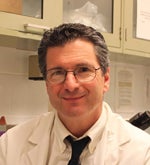
Professor, Oncology
View Dr. Albanese’s Georgetown360 Profile
albanese@georgetown.edu
202-687-3305
Office: GD-10 Pre-Clinical Science Building
Lab: Pre-Clinical Science Building
Education: PhD (Biology) Cardiff University, Wales UK
Current Research: Dr. Albanese’s research program is focused on a better understanding of the roles of oncogenes, tumor suppressors and cell cycle regulatory proteins in the initiation and progression of genitourinary and other cancers. He has an extensive background both in animal modeling and in molecular biology and has been directly involved with the testing of new compounds for inhibiting tumorigenesis. He is also investigating the mechanisms by which chemotherapeutic compounds signal through p53 to induce cell death. He is the originator and director of the Preclinical Imaging Research Laboratory, a comprehensive preclinical imaging suite based on MRI, luminescence/fluorescence IVIS imaging, and ultrasound imaging of models of human diseases. He is also directly involved using and refining conditionally reprogrammed mammalian epithelial cell (CRC) culture methods for high impact research, development and clinical applications. His goal is to enable the development of bedside to bench to bedside translational programs in cancer biology, imaging, and precision therapy.
Sonia de Assis, Ph.D.

Assistant Professor, Oncology
Dr. de Assis’ website
View Dr. de Assis’ Georgetown360 Profile
deassiss@georgetown.edu
202-687-9518 (Office) 202-687-9239 (Lab)
Office: E408 New Research Building
Lab: E408 New Research Building
Education: PhD (Tumor Biology) Georgetown University
Current Research: Unlike the genome, which is relatively stable throughout an organism’s life span, the epigenome (DNA methylation, histone modifications, non-coding RNAs) is malleable to ensure short-term adaptation to the environment. The epigenome is most plastic during early development and environmental exposures during this period can have long-lasting effects. An extensive body of research in animals and humans shows that ancestral (both maternal and paternal) and in utero environmental and nutritional exposures can impact the health of the offspring in later life, through epigenetic reprogramming.
Maria Laura Avantaggiati, M.D./Ph.D.
Associate Professor, Oncology
View Dr. Avantaggiati’s Georgetown360 Profile
ma364@georgetown.edu
202-687-9199
Office: W305 New Research Bldg
Lab: W305 New Research Bldg
Education: MD/PhD University of Rome, La Sapienza, Italy
Current Research: Our research focuses on the mechanisms of action of the p53 gene product, which plays a key role in cellular transformation, aging, senescence as well as in determining the outcome of chemo- and radiotherapy. The p53 gene is also mutated in the majority of cancers and these p53 mutant proteins acquire different functional properties relative to the wild-type protein. While wild-type p53 poses a barrier to the emergence and proliferation of cancerous cells, p53 mutants favor tumor initiation, progression, and metastasis. We are using animal models, as well as genetic and pharmacologic tools, to tackle the mechanisms by which wild-type and mutant p53 exert these activities and to identify the essential components of the p53 pathway that can be exploited to manipulate the decision-making process of cells between life and death. The ultimate scope of our studies is to better understand how cancer develops and to discover new ways to eliminate tumor cells.
Nagi G. Ayad, Ph.D.
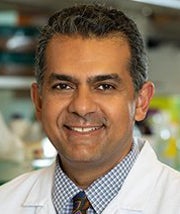
Professor, Oncology
Dr. Ayad’s website
View Dr. Ayad’s Georgetown360 Profile
Na853@georgetown.edu
Office: E512A New Research Building
Lab: E512 New Research Building
Education: Ph.D. (Cell Biology) Yale University
Current Research: Nagi G. Ayad, Ph.D. is a Professor in the Department of Oncology of the Lombardi Comprehensive Cancer Center at Georgetown University Medical Center. Dr. Ayad received his undergraduate degree from Rutgers University in 1992, worked for Merck & Co., Inc. as a biochemist and then pursued graduate studies with Dr. Ira Mellman at Yale University. Dr. Ayad completed his Ph.D. in Cell Biology in 1998 and moved to Harvard Medical School in 1999 to perform a postdoctoral fellowship with Dr. Marc Kirschner. Dr. Ayad then joined The Scripps Research Institute in Jupiter, Florida as an Assistant Professor in 2005 and moved to the University of Miami as an Associate Professor in 2011 and was promoted to Professor in 2021. He moved to LCCC in July 2021. Dr. Ayad’s research has focused on elucidating novel cell cycle pathways. His graduate studies identified a novel means through which endocytosis is inhibited during mitosis, while his postdoctoral studies identified two novel cell cycle regulators, Tome-1 and sororin. His work in his own laboratory has utilized high-throughput screens to identify regulators of cell cycle transitions, cancer, and neurite outgrowth. These regulators include Wee1, Casein Kinase 1, the Anaphase Promoting Complex (APC/C), and BRD4. Dr. Ayad has trained numerous graduate students and postdoctoral fellows who have gone on to successful independent careers. He works closely with computational biologists and clinicians to identify novel treatments for brain cancer using systems biology approaches. His laboratory focuses on identifying therapeutic combinations for medulloblastoma and glioblastoma.
Stephen Byers, Ph.D.

Professor, Oncology
Director for Shared Resources
View Dr. Byers’ Georgetown360 Profile
Byerss@georgetown.edu
202-687-1813
Office: E415A New Research Building
Lab: E415 New Research Building
Education: BSc Liverpool University, UK (Chemistry/Biology), Ph.D. University of Queensland, Australia (Endocrinology)
Current Research: Professor Byers, an Associate Director at Lombardi, was educated in the UK and Australia where he was a Ford Foundation Scholar. He came to the US as a Rockefeller Foundation Fellow. Dr. Byers has authored >150 papers and patents in the areas of, cell adhesion, chemoprevention and the development of anti-cancer drugs. He co-discovered the role of Matrigel in promoting differentiation and developed the first examples of commercial dual environment culture chambers. His group went on to demonstrate the role of cadherins and ß-catenin in promoting epithelial-mesenchymal transitions, discovered the role of phosphorylation in degradation and ubiquitination of ß-catenin and was the first to show the interaction of the vitamin A and D pathways with ß-catenin signaling. Recently his laboratory has focused on the computational repositioning of existing FDA-approved drugs for alternative targets and metabolomic profiling of serum and urine as a means of predicting cancer patient outcomes.
Marta Catalfamo, Ph.D.

Associate Professor, Microbiology and Immunology
View Dr. Catalfamo’s Georgetown360 Profile
mc2151@georgetown.edu
202-687-8675
Office: EG19A New Research Building
Lab: EG19 New Research Building
Education: PhD, Autonomous University of Barcelona, Barcelona, Spain
Current Research: The research focus of my laboratory is understanding the immunopathogenesis of HIV infection. Particularly, the molecular pathways involved in the immune activation of the CD4 and CD8 T cell pools that lead to immune dysfunction. Despite viral suppression, patients with persistent immune activation and increased biomarkers of inflammation/coagulation are at increased risk to develop non-AIDS defining illnesses such as cardiovascular disease and cancer among others. The understanding of these mechanisms is critical to identify targets of immune intervention to restore the immune system and eliminate the viral reservoir. Our studies in this area demonstrated that distinct pathways drive immune activation of CD4 and CD8 T cell pools. This work showed for the first time an unknown synergistic cross-talk between IL-7 and IFN-α and provided new insights in the homeostatic regulation of the CD4 and CD8 T cell pools in healthy controls and HIV infection. In addition, we made the observation that memory T cells express the protease-activated receptor-1 (PAR-1, Thrombin receptor). This novel observation links coagulation/inflammation with an arm of the adaptive immune system. Thrombin, in a PAR1 dependent fashion, enhance T cell effector function and promotes the formation of platelet-CD8 T cell conjugates. These data support a physiological mechanism of immune surveillance, inflammation, and tissue repair. The current areas of research in the lab include:
Fung-Lung Chung, Ph.D.
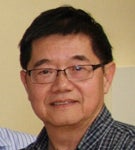
Professor, Oncology
View Dr. Chung’s Georgetown360 Profile
flc6@georgetown.edu
202-687-3021
Office: E215A New Research Building
Lab: E215 New Research Building
Education: Ph.D. (Medicinal Chemistry), University of Utah
Current Research: Dr. Chung is a tenured professor in Oncology. He also has an appointment in the Department of Biochemistry and Molecular & Cellular Biology. His main research focuses on two areas: one is a mechanism of chemical carcinogenesis and the other is cancer chemoprevention. Currently, his lab is using state-of-the-art chemical and biological approaches to study mutations and apoptosis caused by DNA damages arisen from peroxidation of lipids, particularly ω-3 and ω-6 polyunsaturated fatty acids, and investigate their roles in the development of cancers of the lung, liver and colon. In cancer prevention, his lab has discovered certain natural products in plants that possess activities to inhibit carcinogenesis and research is conducted to elucidate the mechanisms of these agents by identifying their molecular targets. For example, his group has recently reported that tubulin and mutant p53 are the potential targets of phenethyl isothiocyanates, a bioactive compound rich in watercress. In addition to these projects, Dr. Chung is actively involved in translating the findings in the lab to the human setting by working with clinicians by conducting clinical trials to study the prevention of cancers in heavy smokers by tea as well as using watercress juice.
Albert Fornace, M.D.

Professor, Biochemistry & Molecular & Cellular Biology, Oncology
Dr. Fornace’s website
View Dr. Fornace’s Georgetown360 Profile
af294@georgetown.edu
202-687-7843
Office: E505A New Research Building
Lab: E505 New Research Building
Education: MD Jefferson Medical College
Current Research: There are currently several areas of active research in the laboratory. In regards to cancer research, a major effort is to understand the effects of radiation, particularly space radiation, on the development of gastrointestinal cancer. Much of these studies are supported by a NASA Specialized Center of Research (NSCOR) led by Dr. Fornace. The effect of estrogen mimics (endocrine disruptors) are being studied with a systems biology approach in a multi-institutional program supported by NIEHS; this and related studies have relevance to breast cancer. An ongoing area of interest is the roles for p38 MAP kinase signaling after stresses such as ionizing radiation and ultraviolet radiation. This includes studies on the Wip1 phosphatase which can function as an oncogene by blocking a variety of tumor suppressor pathways including p53, p38 MAP kinase, ATM, and others. Wip1 studies include their roles in gastrointestinal and skin cancer. Another general area of research is the use of metabolomics and other systems approach to assess the injury responses to stresses such as ionizing radiation and chemical agents. With support from the NIAID Centers for Medical Countermeasures Against Radiation (CMCR), our laboratory is part of a multi-institutional program to develop biomarkers for radiation exposures, such as would occur during a radiologic and nuclear event
Robert I. Glazer, Ph.D.

Professor, Oncology
Dr. Glazer’s website
View Dr. Glazer’s Georgetown360 Profile
glazerr@georgetown.edu
202-687-8324
Office: New Research Building W318
Lab: New Research Building W317, W321, W324
Education: PhD (Pharmacology) Indiana University
Current Research: Over the past 10 years, we have investigated the role of the PPAR family of nuclear receptors in tumorigenesis using transgenic and knockout mice, as well as the functional roles of stem cell genes, such as Musashi1 (Msi1) and stem cell antigen-1 (Sca-1/Ly6A). We discovered that Msi1 controlled the Wnt and Notch pathways in mammary epithelial cells (Wang et al., MCB, 2008), and that it was highly expressed in breast cancer cell lines and primary tumors (Wang et al., Mol. Cancer, 2110). Through the use of Sca-1 deficient mice and RNA interference, we showed that Sca-1 was a major factor in repressing the tumor suppressor genes TGF-β, PTEN and PPARγ (Upadhyay et al., PNAS, 2011; Yuan et al., Cancer Prev. Res., 2012). We have been instrumental in developing several transgenic animal models of breast cancer, including dominant-negative PPARγ mice that established the suppressor role of PPARγ on the mammary stem and progenitor cell expansion and ER+ tumor development (Yin et al., Cancer Res., 2009). More recently, we produced the first mouse model of luminal B breast cancer due to the overexpression of PPARδ (Yuan et al., Cancer Res., 2013). This model also led to the unexpected discovery that the placental gene, Plac1, which is not expressed in most somatic tissues, was highly elevated at the onset of and throughout tumorigenesis. We are currently investigating whether a recombinant adeno-associated virus-1 (AAV1) vaccine targeting Plac1 can activate an adaptive immune response and block tumor formation in two spontaneous mouse models of breast cancer.
Radoslav (Rado) Goldman, Ph.D.

Associate Professor, Oncology, Biochemistry & Molecular & Cellular Biology
View Dr. Goldman’s Georgetown360 Profile
rg26@georgetown.edu
202-687-9868
Office: E207A New Research Building
Lab: E207 New Research Building, GD9 Preclinical Science Building
Education: PhD (Toxicology), University of Pittsburgh
Current Research: Translational studies that combine cancer biology with the development of quantitative mass spectrometric methods. The goal is an early diagnosis of cancer, improved disease classification, understanding of carcinogenic mechanisms, and targeted therapy. We focus on the mass spectrometric analysis of glycopeptides with the aim to determine their functions in the progression of infectious diseases to cancer. Applications include studies of liver, head & neck, and prostate cancers using a growing repository of human samples and relevant model systems. Special interest in glycoprotein evolution, structure, and function. Current research funded by NIH and DOD.
Cecil Han, Ph.D.

Assistant Professor, Oncology
Dr. Han’s website
View Dr. Han’s Georgetown360 Profile
ch1182@georgetown.edu
202-687-8634
Office: W316A New Research Bldg
Lab: W316 New Research Bldg
Education: PhD BIST, South Korea
Current Research: Dr. Han’s lab studies the biology of cancer initiation and progression and aims to find novel anticancer targets based on specific genetic abnormalities or specific metabolic pathways present in the cancers. A main area of research is High-Grade Serous Ovarian Cancer (HGSOC), which causes more deaths than any other cancer of the female reproductive system. We are studying the 1) functional significance of the genomic amplification of USP13 in the development and progression of ovarian cancer; 2) the molecular mechanism by which USP13 reprogram the ovarian cancer metabolism and how we could use USP13 as targeted therapy. Another main research goal is elucidating the molecular mechanisms of how deregulated RNA-binding proteins play roles in cancer. 3) We currently focus on DEAD-Box RNA helicase 3 and its immune regulatory role in cancer progression. We utilize several novel combinations of genetically engineered mouse models with state-of-the-art molecular, biochemical, and genomics technology.
Barry Hudson, Ph.D.

Associate Professor, Oncology
Dr Hudson’s website
View Dr. Hudson’s Georgetown360 Profile
Barry.hudson@georgetown.edu
Office: E216B New Research Building
Lab: E216 New Research Building
Education: Ph.D. University of Leeds, UK
Current Research: Our laboratory is focused on understanding how inflammation and host factors drives breast cancer progression and metastasis. Further, we are interested in how common proinflammatory states (including aging, diabetes, obesity, and stress) exacerbate disease outcomes in people with breast cancer. Our lab is highly translational, studying breast cancer from preclinical/basic science studies through clinical investigations. Findings from our lab have most recently led to the initiation of clinical trials at Georgetown University/MedStar.
Specifically, our lab has primarily focused on the Receptor for Advanced Glycation End-products (RAGE). RAGE is a multi-ligand receptor that drives breast cancer metastasis through signaling in both the tumor cells and non-tumor cells of the tumor microenvironment & host. We were the first to show that RAGE small molecule inhibitors makes breast cancer cells less metastatic. Our current work involves mechanistic dissection of the roles of RAGE in the tumor and tumor microenvironment, and how RAGE influences metastasis. We are also investigating how comorbidities and inflammatory states (including aging, diabetes, obesity, and stress) are regulated by RAGE to drive tumor metastasis.
I have been an independent PI since 2010, and graduate students have been critical to my lab work’s success. I have mentored many graduate students who have gone on to successful careers in academia, medicine, and the pharmaceutical/biotechnology industry. My lab is highly collaborative, and we work with numerous other groups at Georgetown University, which gives trainees exposure to multiple disciplines and expands the depth of our work. I am also highly engaged in graduate student education here at Georgetown through my various roles in the Tumor Biology program.
Michael D. Johnson, Ph.D.

Associate Professor, Oncology
View Dr. Johnson’s Georgetown360 Profile
johnsom@georgetown.edu
202-687-0217
Office: W416 New Research Building
Lab: W412, W422 New Research Building
Education: Ph.D. (Pathology) Newcastle University, UK
Current Research: Dr Johnson has been working in the field of breast cancer research for more than twenty five years, studying the role of survival signaling in mammary carcinogenesis, the role of a variety of proteases in breast cancer progression, invasion, and metastasis, and various aspects of estrogen dependence and antiestrogen resistance in the treatment of estrogen receptor positive breast cancer. More recently his work on the serine protease matriptase and its inhibitor HAI-1 has lead to research on the role of this protease-inhibitor system in normal skin biology, epidermal differentiation, and carcinogenesis, its role in epithelial differentiation, and its contribution to the carcinogenesis and malignant progression in the breast and hematologic malignancies.
Usha N. Kasid, Ph.D.
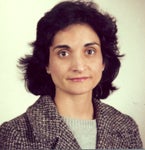
Professor, Oncology & Biochemistry & Molecular & Cellular Biology
Dr. Kasid’s website
View Dr. Kasid’s Georgetown360 Profile
kasidu@georgetown.edu
202-687-2226
Office: W326 New Research Bldg
Lab: Building D
Education: PhD Punjab University, India
Current Research: Usha N. Kasid, PhD, is a Professor of Radiation Medicine and Biochemistry and Molecular & Cellular Biology; Molecular Oncology, Lombardi Comprehensive Cancer Center. She received her Ph.D. from Punjab University in India, and her post-doctoral training as a Fogarty Fellow in the Laboratory of Biochemistry at the National Cancer Institute, NIH. Dr. Kasid’s research interests in the areas of cancer biology and developmental therapeutics include: Raf-1/Erk signaling; integrins; tumor growth and metastasis; the mitochondrial pathway of cell death; ER stress response; radiation resistance and chemoresistance; systemic delivery of antisense and siRNA containing liposomal nanoparticles; breast, prostate and pancreatic cancers.
Samir N. Khleif, M.D.
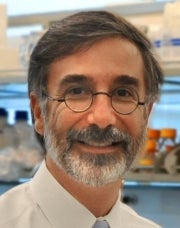
Professor of Oncology
Dr. Khleif’s website
View Dr. Khleif’s Georgetown360 Profile
VV149@georgetown.edu (Dr. Verma)
202-687-7953 (Dr. Verma)
Office: Suite E501 New Research Building
Lab: GD01 Preclinical Science Bldg.
Education: M.D. University of Jordan
Current Research: As an immunologist and immune therapist, my interest has been in developing novel immune therapeutics, cancer vaccines and delineating the mechanisms of resistance to immunotherapy. My research program is translational tumor immunology focused on understanding mechanisms through which the immune system and cancer cells interact and how to overcome tumor tolerance in developing therapeutic approaches.
Joanna Kitlinska, Ph.D.

Associate Professor, Biochemistry and Molecular and Cellular Biology
View Dr. Kitlinska’s Georgetown360 Profile
jbk4@georgetown.edu
202-687-5229
Office: 231A Basic Science Building
Lab: 234 Basic Science Building
Education: PhD Medical University of Lublin, Poland
Current Research: Research in Dr. Kitlinska’s laboratory focuses on the role of a sympathetic neurotransmitter, neuropeptide Y (NPY) in tumor biology. NPY is normally released from the activated sympathetic neurons, e.g. during stress. However, the tumors with neuronal features, such as two pediatric malignancies, neuroblastoma and Ewing’s sarcoma, may also synthesize and release this peptide. We have found that NPY is not only a marker of neuronal differentiation of these tumors but also an active regulator of their growth and vascularization. Currently, we are exploring the role of NPY in metastases of these tumors, as well as assessing NPY and its receptors as targets in their therapy. Since NPY is highly up-regulated during chronic stress, our findings on its important role in the regulation of tumor growth and dissemination triggered our interest in the impact of stress on cancer progression and development. At present, we are investigating the effect of prenatal stress on the development of neuroblastoma – a childhood tumor arising due to defects in sympathetic neuron differentiation.
Gary Kupfer, M.D.

Professor, Oncology and Pediatrics
Dr. Kupfer’s website
View Dr. Kupfer’s Georgetown360 Profile
gary.kupfer@georgetown.edu
Office: New Research Building
Lab: New Research Building
Education: M.D. Johns Hopkins
Current Research: The Kupfer Lab works on the relationship of genomic instability and the propensity towards development of cancer. Specifically, we focus on the genetic syndrome Fanconi anemia (FA). Interestingly, children with FA are born with congenital anomalies and develop aplastic anemia and an assortment of leukemias and other cancers. FA serves as a paradigm where the disciplines of development, genetics, and molecular oncology come together. Like other cancer susceptibility syndromes, such as ataxia telangiectasia and xeroderma pigmentosum, FA patients exhibit a unique hypersensitivity to DNA crosslinking agents, which is the key to the biology of FA. Unlike the other syndromes, exceedingly little is known about FA. Thirteen complementation groups have been elucidated, with all exhibiting similar phenotypic characteristics, suggesting an interrelationship of proteins in a complex or in a linear pathway.
To date, 23 genes have been cloned, but the encoded proteins are of uncertain function. Excitingly, BRCA1 and BRCA2 are bona fide genes as well. Recent work, including our own, has implicated a role for FA in homologous recombinatorial repair. Interestingly, the FA pathway and breast cancer biology have significant overlap, as at least 5 FA genes are bona fide familial breast cancer genes.
Our work and potential rotation/thesis projects focus on:
- protein-protein interactions of FA proteins
- signal transduction pathway of FA proteins
- resolution of DNA and RNA intermediates to protect replication forks and prevent replication:transcription collisions
- biochemistry of FA protein function, including recombinant DNA repair enzymology
- animal models of DNA repair
- translation of DNA repair biology to cancer therapy and prevention of bone marrow failure
Marc Lippman, M.D.
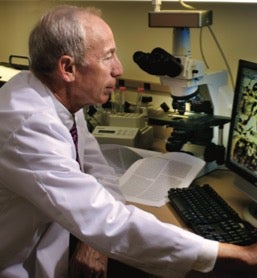
Professor, Oncology and Internal Medicine
View Dr. Lippman’s Georgetown360 Profile
mel316@georgetown.edu
202-687-2205
Office: W503B New Research Building
Lab: W412 and E512 New Research Building
Education: M.D., Yale University
Current Research: Our lab focuses on breast cancer with a particular emphasis on how t\various aspects of the host macro-environment influence the tumor micro-environment to promote occurrence and progression of disease. We are particularly interested in the molecular mechanisms whereby host diseases such as depression, obesity, diabetes and inflammation alter disease pathogenesis. We have demonstrated [in collaboration with another Lombardi investigator – Barry Hudson with whom we share many projects and grants] that a critical pathway for signaling from host to tumor involves RAGE [ the receptor for advanced glycation end products] and have shown through genetic, molecular and biochemical approaches that this signaling is critical and clinically targetable with a series of antagonist drugs. We have shown that RAGE signaling is far higher in all of the above conditions and generated data showing that this signaling explains part of the lethality of host inflammatory states. Our studies are organized at in vitro and in vivo levels as well as multiple clinical translational trials in patients. In other work we have focused on the role of supporting stroma in driving breast cancer progression. We have characterized a series of cancer associated fibroblasts [CAF’s] which can confer a variety of phenotypes on breast cancer cells including the induction of metastases otherwise more indolent breast cancers.
These studies also have clinically actionable mechanisms which we are investigating in a variety of model systems.
Christopher Loffredo, Ph.D.

Professor, Oncology and Biostatistics
View Dr. Loffredo’s Georgetown360 Profile
cal9@georgetown.edu
202-687-3758
Office: W503 New Research Building
Education: Ph.D. (Toxicology), University of Maryland, Baltimore
Current Research: Dr. Christopher Loffredo co-leads the Cancer Prevention and Control Program of the Lombardi Comprehensive Cancer Center. He teaches graduate school courses in epidemiology and biostatistics. Dr. Loffredo is an internationally known researcher in the fields of cancer and birth defects. His research focuses on the environmental and genetic causes of these diseases, and especially on the roles that genetics plays in mediating the risks from environmental chemical exposures. His research projects span liver, bladder, and lung cancer in relation to chronic infections such as hepatitis C virus, and environmental factors such as smoking and pesticides. He has directed collaborative research in Egypt for the past 15 years and is also the principal investigator of a project with Russian scientists related to ionizing radiation exposure and its long term cancer risks. At Georgetown, he leads a group focused on developing biomarkers for the early detection of liver cancer in high-risk patients.
Jeanne Mandelblatt, M.D.

Professor, Oncology and Medicine
View Dr. Mandelblatt’s Georgetown360 Profile
mandelbj@georgetown.edu
202-687-0812
Office: 3300 Whitehaven Street NW, Suite 4100
Education: MD Columbia University
Current Research: Dr. Mandelblatt is a tenured Professor of Medicine and Oncology at Georgetown University and a founding member of the Cancer Prevention and Control Program. She is the immediate past Associate Director of Population Sciences. With her cross-disciplinary training in geriatrics, health services research, and cancer epidemiology, Dr. Mandelblatt is a nationally recognized population scientist with more than two decades of continuously, multi-RO1 funded NIH collaborative research focused on cancer, aging, and policy. Dr. Mandelblatt has published more than 230 articles to date with her colleagues, with close to 17,000 citations of this work (H-index of 63). The narrative in Section C below summarizes the impact of this work on the field. In recognition of her leadership and collaborative scientific accomplishments, Dr. Mandelblatt held an NCI Senior Cancer Control Scientist Award from 2002 to 2013 and was awarded a seven-year NCI Outstanding Investigator Grant in 2015 (R35) to study cancer and aging. This body of work examines the effects of cancer and its treatments on aging trajectories and how they affect functioning. A unique aspect of this research program on cancer and aging is the use of population-based research findings to drive basic discovery in animal models, and to use mechanistic insights from the basic science laboratory to inform the next generation of clinically relevant population research studies, and address policy questions that follow from these discoveries. This latter aspect of Dr. Mandelblatt’s research program has been conducted within the NCI Cancer Intervention and Surveillance Modeling Network (CISNET), where she been continuously funded for the past 17 years. In addition to leading her own modeling grant, Dr. Mandelblatt serves as the lead of the CISNET Breast Working Group (BWG) coordinating center (2010-2020). She led the BWG in simulation modeling analyses for the US Preventive Services Task Force in 2009 and 2015; her expertise in aging supported testing of the role of comorbidity in upper age limits for screening. Another key component of Dr. Mandelblatt’s accomplishments include use of her research program to provide an environment for the training of new investigators. Dr. Mandelblatt has a long track record of mentoring, with more than 20 past trainees who have all gone on to obtain independent grant funding and academic or public health careers. Institutional support has allowed recent recruitment of two junior faculty members to work under Dr. Mandelblatt’s mentorship: Dr. Jayasekera and Dr. Kobayashi. Dr. Mandelblatt has also served on multiple NIH study sections, is currently an Associate Editor at the Journal of the National Cancer Institute, and serves as an external advisor to several comprehensive cancer centers. This background provides Dr. Mandelblatt with unique expertise to conduct and support cancer prevention and control research at Lombardi.
Mary Beth Martin, Ph.D.
Professor, Oncology
View Dr. Martin’s Georgetown360 Profile
MaryBeth.Martin@georgetown.edu
202-687-3768
Office: E411A New Research Building
Lab: E411 New Research Building
Education: PhD (Biochemistry) University of Medicine & Dentistry of New Jersey
Current Research: Dr. Martin’s primary research interest is in the role of steroid receptors in breast cancer and focuses on the mechanisms that regulate expression and activity of the receptors. Her initial work in the field showed that estradiol and growth factors regulate the expression of estrogen receptor-alpha (ERa) through several mechanisms including regulation of transcription of the ERa gene, stability of the ERa transcript, and translation of ERa mRNA. In addition to defining the mechanisms that regulate expression, her laboratory is interested in defining the mechanisms that regulate ERa activity. The laboratory was the first to show that growth factors activate ERa through the AKT pathway and was the first to show that metals/metalloids activate ERa by binding to the ligand binding domain. The Martin laboratory is currently interested in defining the role of metals/metalloids in the etiology and progression of breast cancer and the molecular mechanism by which metals/metalloids activate ERa.
Sreejith Nair, Ph.D.
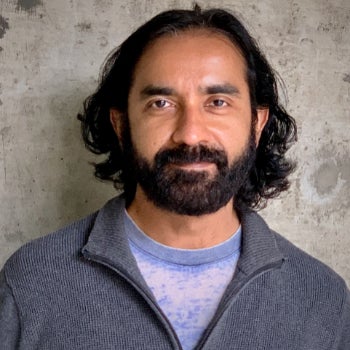
Assistant Professor, Oncology
View Dr. Nair’s Georgetown360 Profile
sn778@georgetown.edu
Education: PhD (Molecular Biology) University of Texas Health Science Center at San Antonio
Current Research: Dr. Nair’s lab is broadly interested in the regulatory mechanisms of eukaryotic gene expression, nuclear organization, and how the disruption in these cellular processes results in cancer, endocrine dysfunctions, and other disease states. At one point in our life, all of us were single-cell organisms. How that single-cell evolved into a fully developed living being with complex phenotypes and hundreds of cell types is a fascinating question that is just beginning to be understood. This cellular evolution, phenotypic variations, and also a significant fraction of disease conditions are contributed by (i) variations encoded at the level of DNA, (ii) variations in reading genomic information, (iii) novel alterations in the genome through errors in copying the information or environmental factors. Our lab is curious about all these aspects of eukaryotic genome biology. At a practical level, we focus on understanding the molecular mechanisms by which cellular identities are determined both during normal developmental programs and in cancer. We also study how the environmental and hormonal stimuli precisely turn on and turn off specific sets of genes. We hypothesize that gene regulation involves not only individual transcription factors and co-factors but a variety of nuclear organelles and macromolecules. We use multidisciplinary approaches involving genomic, proteomic, genome engineering, microscopic, and computational strategies to explore eukaryotic gene regulation and epigenetic basis of cancer development and therapeutic resistance.
Vicente Notario, Ph.D.

Professor, Radiation Medicine, and Biochemistry and Molecular & Cellular Biology
View Dr. Notario’s Georgetown360 Profile
notariov@georgetown.edu
202-687-2102
Office: E208A New Research Building
Lab: E208 New Research Building
Education: PhD (Biology) University of Salamanca, Spain
Current Research: Dr. Notario’s research group focuses on studies of molecular mechanisms of oncogenesis that involves the investigation of the effects of environmental chemical carcinogens and radiation on mammalian cells with regard to the expression and activity of cancer genes and their protein products. The central objective is to understand the molecular and cellular basis for cancer initiation and progression as well as mechanisms involved in the acquisition of resistance to anti-cancer therapy, with emphasis on pathways that may be exploited to improve the treatment of metastatic cancers and to sensitize human tumors to chemotherapeutic drugs and radiation therapies. Ongoing studies are centered on establishing the role of the mt-PCPH oncoprotein, previously discovered in the Notario laboratory, as a driver of the malignant phenotype of human prostate and colorectal tumors, particularly on its involvement in the regulation of cancer cell invasiveness and the onset of therapeutic resistance. In addition, the Notario laboratory studies molecular targets and pathways that may enhance the sensitivity to radiotherapy of Ewing’s sarcoma, a very aggressive type bone tumors that predominantly affect children and young adults. Related areas of research explore the anti-tumorigenic activity of the PEDF protein using various experimental systems for experimental carcinogenesis as well as the possible anti-cancer actions of human dietary components. Dr. Notario has authored over 140 publications and has been continuously funded by the U.S. National Cancer Institute since 1986.
Gray W. Pearson, Ph.D.

Associate Professor, Oncology
View Dr. Pearson’s Georgetown360 Profile
gp507@georgetown.edu
202-687-9302
Office: W309A New Research Bldg
Lab: W321 New Research Bldg
Education: PhD University of Texas Southwestern
Current Research: Understanding how intratumor phenotypic heterogeneity promotes disease progression is essential to improve patient care. My research group focuses on the cooperative relationships between distinct tumor subpopulations, which are a critical yet poorly understood property of heterogeneity within tumors. A substantial barrier impeding our understanding of collaborative tumor cell interactions has been the lack of techniques for defining how discrete tumor cell variants interact during tumor development. We have addressed this challenge by developing methods for sophisticated live-imaging and functional interrogation of tumor population dynamics in organotypic culture systems and primary tumor models. With this approach, we uncovered a new symbiotic relationship between tumor subpopulations that promotes a transition from benign to malignant growth by inducing the collective invasion of cohesive groups of cells. This democratization of invasive behavior through subpopulation cooperation eliminates a bottleneck in tumor evolution, thus unleashing the metastatic potential of a more diverse tumor cell population. Extensive phenotypic variability within the invasive tumor cell community may negatively impact patient outcome by accelerating the progression to metastatic disease. Indeed, our functional dissection of this new form of tumor cell cooperation has revealed fresh approaches for improving the accuracy of patient diagnosis and uncovered previously unrecognized therapeutic targets with associated sensitivity signatures. Our future objectives are to (i) continue defining the composition and function of signaling pathways that promote cooperative collective invasion; (ii) investigate how cancer hallmarks can be shared by tumor cells in synergistic relationships; and (iii) determine how population diversity influences tumor responses to conventional therapeutics and emerging approaches that harness the power of the immune system.
Habtom Ressom, Ph.D.

Professor, Oncology
Dr. Ressom’s website
View Dr. Ressom’s Georgetown360 Profile
hwr@georgetown.edu
202-687-2283
Office: 175 Building D
Lab:173 Building D and W325 New Research Building
Education: PhD University of Kaiserslautern, Germany
Current Research: Dr. Ressom is interested in using multi-omic approaches for cancer biomarker discovery and systems biology research. The computational group in his laboratory develops workflows for large-scale omic studies, statistical and machine learning methods for the analysis of mass spectrometric data, and algorithms for biological network inference from multiple data sources. His wet laboratory applies high-throughput omic technologies for the identification and quantification of biomolecules in human biospecimens. Current research in Ressom Lab focuses on the analysis of liver tissues and blood samples by mass spectrometry-based multi-omic techniques (metabolomics, proteomics, glycomics, and glycoproteomics) to find biomarkers for hepatocellular carcinoma and to investigate aberrant pathways and network activities.
Anna Tate Riegel, Ph.D.

Professor, Oncology & Pharmacology
Dr. Riegel’s website
View Dr. Riegel’s Georgetown360 Profile
ariege01@georgetown.edu
202-687-4821
Office: E307A New Research Building
Lab: E307 New Research Building
Education: PhD (Oncology) University of Wisconsin, McArdle Lab
Current Research: Dr. Riegel’s research is focused on the role and regulation of nuclear receptor coactivators in epigenetic changes that drive breast cancer progression. The long-term goal of her research is to understand how epigenetic signals enhance tumor cell / stromal and immune interactions and ultimately to determine ways that this cross talk could be interrupted therapeutically. Her lab is currently focused on how the nuclear receptor coactivator AIB1 (amplified in breast cancer 1) and its more active oncogenic isoform 4, as well as the co-repressor ANCO1 drive the development of breast cancer. We have determined that these coregulators exist in chromatin as a complex that results in transcriptional repression, via epigenetic regulation of pro-oncogenic gene expression. We are currently investigating the regulation of this epigenetic event and how this impinges on cancer progression in vivo.
Rebecca Riggins, Ph.D.

Assistant Professor, Oncology
Dr. Riggins’ website
View Dr. Riggins’ Georgetown360 Profile
rbr7@georgetown.edu
202-687-1260
Office: E412A New Research Building
Lab: E412 New Research Building
Education: PhD (Microbiology) University of Virginia
Current Research: My laboratory’s research is focused on understanding how estrogen-related receptors (specifically ERRbeta and ERRgamma) function in cancer. We were the first to demonstrate that estrogen-related receptor gamma (ERRgamma), an orphan nuclear receptor with broad similarity to classical estrogen receptor alpha (ERα), plays a key functional role in the acquisition of Tamoxifen resistance in ER+ breast cancer and is a substrate for ERK/MAPK. Newer studies in my lab focus on identifying the mechanism(s) by which DY131, a synthetic agonist of ERRbeta/gamma, induces cell cycle arrest and death in models of brain and triple-negative breast cancer. In conjunction with classical wet-lab studies, I have also been actively involved with the development of several bioinformatics tools, including the Georgetown Database of Cancer (G-DOC), which my informatics colleagues and I used in a recent publication that identified essential mitosis regulatory networks associated with early distant metastasis in ER+ breast cancer.
David Robbins, Ph.D.

Professor, Oncology
Dr. Robbins’ website
View Dr. Robbins’ Georgetown360 Profile
dr956@georgetown.edu
202-784-1377
Office: E520A New Research Building
Lab: E520, E521 New Research Building
Education: Ph.D. (Pharmacology) University of Texas Southwestern
Current Research: Developmental signaling pathways, such as those controlled by the extracellular ligands Wnt and Sonic Hedgehog (Shh), play pivotal roles in the initiation, progression and chemotherapeutic resistance of many cancers. As such, their dysregulation affects the mortality and morbidity of large numbers of such patients. Despite being commonly studied, few therapeutic agents against these highly cancer relevant signaling pathways are in clinical use. My background in both development and cancer biology provides me a unique perspective with which to identify novel, context-dependent steps in these pathways. My current focus is on understanding the role Wnt signaling plays in colorectal cancer and the role Shh signaling plays in brain tumors. The ultimate goal of our work is to identify novel therapeutic agents for cancer patients harboring tumors dependent on these developmental signaling pathways. Thus, the work in my lab spans the spectrum from basic mechanism to preclinical/translational relevance.
Rabindra Roy, Ph.D.

Associate Professor, Oncology
View Dr. Roy’s Georgetown360 Profile
rr228@georgetown.edu
202-687-7390
Office: LF09A, Pre-Clinical Science Building
Lab: LF05, Pre-Clinical Science Building
Education: PhD (Biochemistry) Indian Institute of Chemical Biology, India
Current Research: The research themes in my group is centered on the mechanism studies of canonical and non-canonical functions of Base Excision Repair (BER), a major DNA repair pathway, in various cancers. Cellular inflammatory conditions, cigarette smoke, and environmental pollutants induce DNA damage and cause mutations and genome instability, an important ‘enabling’ hallmark of cancer cells. We focused on the canonical role of BER genes in repairing those DNA lesions and how this prevents mutations and cancer. Chemotherapeutic drugs currently account for a large portion of anti-cancer therapy, and a significant fraction of these drugs function mechanistically through inducing cytotoxic DNA damage. While multiple mechanisms of drug resistance exist, processing and repair of drug-induced toxic DNA damage by BER proteins is a major source of chemotherapy resistance. We also focused on identifying small molecule inhibitors of BER proteins for chemosensitization of resistant cancer cells. Our recent findings of potential cross-talk between BER genes and growth factor signaling pathways revealed a novel non-canonical function of BER genes. Understanding this new role of BER genes will lead to potential targets that are amenable to therapeutic intervention. Our studies feature a combination of cellular, molecular, biochemical and biophysical approaches.
C. Richard Schlegel, M.D./Ph.D.
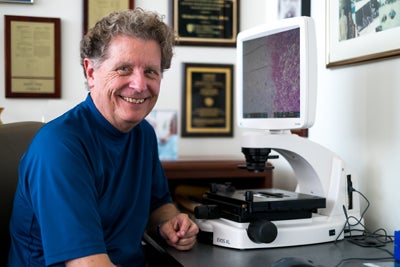
Professor, Pathology
Chairman, Department of Pathology
Director, Center for Cell Reprogramming
View Dr. Schlegel’s Georgetown360 Profile
The Center for Cell Reprogramming website
The Center for Cell Reprogramming Facebook page
Richard.Schlegel@georgetown.edu
202-687-1655
Office: W500 New Research Building
Lab: GR-10C Preclinical Science Building
Education: MD, PhD (Microbiology) Northwestern University
Current Research: Richard Schlegel, MD, PhD, is the Oscar B. Hunter Chair of Pathology and an expert in human papillomaviruses (HPV) and cervical cancer. Dr. Schlegel received his MD and PhD degrees from Northwestern University Medical School, and was a resident and post-doctoral fellow at Harvard Medical School (Brigham Hospital) in the fields of Pathology and Virology. He moved to the National Institutes of Health in 1980 where he continued his viral oncology studies and became the Chief of the Cell Regulation Section in the Laboratory of Tumor Virus Biology. In 1990 he moved from NIH to Georgetown University Medical Center to join forces with immunology and pathology experts who were researching the connection between cervical cancer and HPV. His laboratory used molecular and cell biology assays to define the genes required for HPV-mediated cell immortalization and he co-developed the technology for the vaccine against human papillomavirus (HPV). HPV causes nearly all cervical cancers and contributes to many other human cancers including those of anal, oral and skin origin. On June 8, 2006 the Food and Drug Administration approved the vaccine, called Gardasil, and recommended it for women between the ages of nine and 26. The CDC and pediatric medical associations now recommend it for boys as well as girls. He has published more than 150 papers on viral oncology, served on the editorial board of the journal Virology, has been a permanent member of the NIH Virology study section, and is now a member of the College of CSR Reviewers. In addition, Dr. Schlegel has received Georgetown’s Presidents Award, Vicennial Award, and Patrick Healy Award and has patented several technologies related to HPV diagnostics and prevention. Today, Dr. Schlegel’s laboratory is focused on a new cell biology technique that his laboratory developed which allows the rapid establishment of normal and tumor cell cultures from cancer patients. This technology, termed conditional reprogramming, has multiple applications for basic science and medicine. The technology has spawned a new biotechnology company, Propagenix, which will focus on diagnostic and regenerative medicine applications.
Ayesha Shajahan-Haq, Ph.D.

Assistant Professor, Oncology
Dr. Shajahan-Haq’s website
View Dr. Shajahan-Haq’s Georgetown360 Profile
ans33@georgetown.edu
202-687-7451
Office: E404B New Research Building
Lab: E404 New Research Building
Education: PhD (Pharmacology) University of Illinois at Chicago
Current Research: Dr. Shajahan-Haq’s research focus is on understanding the reprogramming of signaling and metabolic pathways associated with drug resistance in breast cancer. In her currently funded projects, she is investigating the role of glutamine metabolism in estrogen receptor-positive breast cancer, and whether there are disparities in how breast cancer cells respond to drugs based on the race of the patient. Also, she has collaborative multi-disciplinary projects with math modelers and computational biologists to understand how the complex cancer systems respond and change with therapy and how to optimize treatment regimens.
Dr. Shajahan-Haq is also a Scientific Advisor to the Georgetown Lombardi Breast Cancer Patient Advocacy Committee.
Joyce Slingerland, Ph.D.
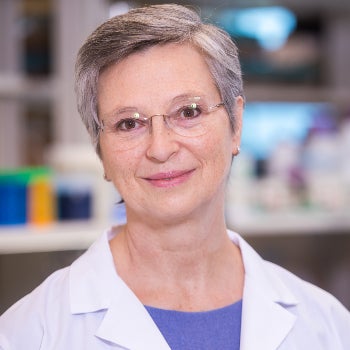
Professor, Oncology
View Dr. Slingerland’s Georgetown360 Profile
js4915@georgetown.edu
Jill P. Smith, M.D.

Professor, Medicine
View Dr. Smith’s Georgetown360 Profile
jps261@georgetown.edu
202-444-3646 (Office) 202-687-2020 (Lab)
Office: Room 2408 Main Building
Lab: Room 338 Building D
Education: MD University of Florida, Gainesville
Current Research: Dr. Smith is a clinician-scientist involved in translational research of pancreatic cancer. Her research focuses on the role of the gastrointestinal peptides gastrin and CCK on the growth of pancreatic cancer and the receptors through which they mediate their response: the Cholecystokinin- B receptor. Dr. Smith is involved in studying the role of dietary fat and cancer. Her lab discovered a novel mutant receptor called the CCK-C receptor that is the result of an SNP present in 35% of those with pancreatic cancer. Research efforts are also exploring the mechanisms of cell signaling mediated via this unique receptor. Dr. Smith’s studies also involved correlation and translation to studies in human subjects with precancerous conditions (chronic pancreatitis).
Jeffery A. Toretsky, Ph.D.

Professor, Oncology
Dr. Toretsky’s website
View Dr. Toretsky’s Georgetown360 Profile
jat42@georgetown.edu
202-687-8655
Office: W311 New Research Building
Lab: E316 New Research Building
Education: MD.University of Minnesota
Current Research: Dr. Jeffrey Toretsky has been studying Ewings sarcoma since 1992. His early work investigated minimal residual disease, antisense oligonucleotide growth inhibition, and novel EWS-FLI1 targets and protein interactions. The Toretsky laboratory continues to focus on Ewing sarcoma, since the tumors contain a unique target, EWS-FLI1, which is not found in non-tumor cells. We created the first small molecule to directly target EWS-FLI1, YK-4-279, which is a useful laboratory probe and advancing to clinical trials. In addition to Ewing sarcoma, YK-4-279 appears to target other malignancies with amplified FLI1 including glioblastoma (GBM). Thus, investigating the comparative mechanism of YK-4-279 is ongoing.
The oncologic process set in motion by EWS-FLI1 remains relatively cryptic despite the identification of many transcriptional targets. Projects that elucidate these mechanisms include investigation of alternative splicing, helicase regulation, and histone alterations that modify chromatin access by transcription factors. Active collaborations include physicists, chemists, and informaticians to answer questions in a multidisciplinary fashion.
Aykut Üren, M.D.
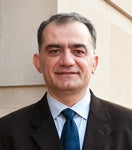
Associate Professor, Oncology
Dr. Üren’s website
View Dr. Üren’s Georgetown360 Profile
au26@georgetown.edu
202-687-9504
Office: E312, New Research Building
Lab: E316 New Research Bldg
Education: MD Hacettepe University School of Medicine in Ankara, Turkey
Current Research: Dr. Üren’s lab investigates molecular mechanisms involved in cancer metastasis including ezrin in osteosarcoma and ERG in prostate cancer. The main goal of the research program is to develop small molecules that can target specific protein-protein interactions containing ezrin or ERG. Normal functions of these proteins and biological significance of inhibiting them are studies at the biochemical and cellular level with in vitro assays. Promising compounds are further validated on in vivo cancer models. Dr. Üren also runs the Biacore Molecular Interactions Shared resource, which performs surface plasmon resonance experiments as a service to Georgetown University and other academic institutions.
Alejandro Villagra, Ph.D.

Associate Professor, Oncology
View Dr. Villagra’s Georgetown360 Profile
alejandro.villagra@georgetown.edu
202-687-4840
Office: E416A New Research Building
Lab: E416 New Research Building
Education: Ph.D. (Biological Sciences) University of Concepcion, Chile
Current Research: The primary research areas in our group are tumor immunology and epigenetics. Examples of our current research interest are 1) Evaluate new combination therapies to optimize ongoing immunotherapies, 2) Design and evaluation of new histone deacetylase inhibitors (HDACis) to improve in vivo antitumor immune responses, 3) Design new technologies for the reprogramming of macrophages for cell therapy, and 4) Evaluation of new molecular targets to control molecular pathways involved in wound healing, autoimmunity, metabolic modulation, etc. These research topics have advanced numerous technologies and drug compounds that have been licensed by pharmaceutical companies and are currently under IND planning. One of my group’s most successful research topics involves designing, developing, and preclinical evaluating new HDAC inhibitors with anticancer properties in melanoma, breast cancer, lymphoma, and other malignancies.
Todd A. Waldman, M.D./Ph.D.

Professor, Oncology
View Dr. Waldman’s Georgetown360 Profile
waldmant@georgetown.edu
202-687-1340
Office: E304A New Research Building
Lab: E304 New Research Building
Education: MD, PhD (Human Genetics) Johns Hopkins School of Medicine
Current Research: We are interested in the discovery, functional analysis, and therapeutic targeting of tumor suppressor genes in glioblastoma multiforme (GBM), which is the most common and deadly primary tumor of the brain. Over the past five years we have identified a number of new GBM tumor suppressor genes, including STAG2, p18INK4c, and PTPRD. In addition to identifying new GBM tumor suppressors, we use a variety of advanced techniques in somatic cell genetics such as human somatic cell gene targeting to study the role of the PTEN tumor suppressor in the pathogenesis of GBM. We are also working together with our close collaborator David James at UCSF to evaluate the potential efficacy of cdk4/6 inhibition as a therapeutic strategy for GBM. Please follow the links above for information on our specific research interests, people in the lab, and our recent publications.
Louis M. Weiner, M.D.

Professor, Oncology
Director, Lombardi Comprehensive Cancer Center
View Dr. Weiner’s Georgetown360 Profile
weinerl@georgetown.edu
202-687-2110
Office: E501 New Research Building
Lab: W322 New Research Building
Education: MD Mount Sinai School of Medicine
Current Research: Louis M. Weiner, MD, director of Georgetown Lombardi Comprehensive Cancer Center, is an internationally recognized medical oncologist. Dr. Weiner is an expert on clinical cancer treatment, particularly in treating gastrointestinal cancers. During his career-long cancer immunology scientific laboratory research, Dr. Weiner has focused on new therapeutic approaches that galvanize a patient’s own immune system to fight cancer using monoclonal antibodies ─ laboratory—crafted proteins designed to recognize specific cancer cells. He has designed and produced antibody-based proteins with improved tumor-targeting and immune-stimulating properties that have shown tumor targeting is impaired if the antibodies attach too tightly to their targets. Monoclonal antibody therapy has emerged as a major treatment for many common cancers, including breast cancer, colon cancer, lymphoma, chronic lymphocytic leukemia and cancers of the head and neck.
Anton Wellstein, M.D./Ph.D.
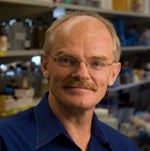
Professor, Oncology, Pharmacology & Medicine
Dr. Wellstein’s website (new window)
View Dr. Wellstein’s Georgetown360 Profile
Anton.Wellstein@georgetown.edu
202-687-3672
Office: E311A, New Research Bldg
Lab: E311 New Research Building
Education: M.D./Ph.D. (Clin. Chemistry/Pathology) J.Gutenberg-University, Mainz/Germany
Current Research: Dr. Wellstein trained as an MD & PhD (Pharmacology) in Germany and then on a sabbatical at NCI/NIH to study growth factor signaling in breast cancer in Marc E Lippman’s lab. He was then recruited to the faculty of Georgetown University in the Departments of Pharmacology and Oncology, where he is a tenured Professor. His lab discovered that the receptor for the growth factor pleiotrophin is ALK (anaplastic lymphoma kinase) and defined the role of secreted binding proteins for FGF (FGFBPs) in cancer, physiology, and development. Dr. Wellstein’s work is focused on tumor / stromal interaction with a particular emphasis on the activity of FGFs and the pleiotrophin/ALK signaling pathways. His major interest is in mechanisms of cancer invasion and metastasis. His laboratory studies cellular, molecular and biochemical signal transduction mechanisms in vitro as well as in tumors, transgenic and knockout animal models and clinical samples. Published >170 papers.
Chunling Yi, Ph.D.

Assistant Professor, Oncology
View Dr. Yi’s Georgetown360 Profile
CY232@georgetown.edu
202-687-8484
Office: E301A New Research Building
Lab: E301 New Research Building
Education: PhD (Mol. Cell. & Dev. Biology) Yale University New Haven, CT
Current Research: My lab is interested in understanding how cancer cells rewire their signaling network to evade growth suppression and translating this knowledge to effective cancer treatment strategies. We employ a diverse set of molecular, cellular, genomic, biochemical and mouse genetic tools to tackle these complex yet important questions. Currently, we are focusing on dissecting the signal circuitry surrounding the Hippo-Yap pathway and its implications in cancer initiation, progression, and drug resistance. The Hippo-Yap pathway has emerged in recent years as a central cancer pathway that underlies many types of common and rare human cancers. My lab is actively investigating the roles of the Hippo-Yap pathway in pancreatic, lung, liver and kidney cancers as well as a rare genetic disorder – Neurofibromatosis Type 2 (NF2). Simultaneously, we are working on developing novel Yap small molecular inhibitors, which we hope to one day can be used to treat diseases involving deregulation of Hippo-Yap signaling.
Supporting Faculty
Kristi D. Graves, Ph.D.

View Dr. Graves’ Georgetown360 Profile
Current Research: Dr. Graves received her Ph.D. in Clinical Psychology from Virginia Polytechnic Institute and State University and completed post-doctoral training at the University of Kentucky. She is a tenured Associate Professor of Oncology and in the Cancer Prevention and Control Program at the Lombardi Comprehensive Cancer Center at Georgetown University. Dr. Graves is leading a research project funded by the Patient-Centered Outcomes Research Institute to help Latina breast cancer patients and their caregivers improve their quality of life. This project is in collaboration with four community-based organizations. Dr. Graves also conducts research in the area of communicating genetic/genomic risk information about cancer risk. She is interested in behavioral and psychosocial outcomes for people at risk for and surviving cancer. Dr. Graves is also involved in teaching within Georgetown University Medical Center (tumor biology) and the Georgetown University School of Medicine (mind-body medicine; patient-physician communication).
Bassem Haddad, M.D.
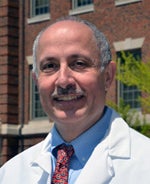
Associate Professor, Oncology
View Dr. Haddad’s Georgetown360 Profile
haddadb1@georgetown.edu
202-444-0759
Office: E204A New Research Building
Lab: E204 New Research Building
Education: MD American University of Beirut, Lebanon
Current Research: The focus of our research is to identify, characterize and understand the molecular cytogenetic aberrations and instability involved in genetic diseases, particularly cancer. The precise definition of genetic imbalances and their accurate chromosomal map localization gives us the opportunity to identify genes involved in tumorigenesis and tumor progression and understand their role. Our main goal is to translate the knowledge accumulated through research to clinical applications in the diagnosis and prognosis of diseases and in biomarker discovery. To achieve these research goals, we have established in our laboratory, a variety of molecular cytogenetic technologies including array comparative genomic hybridization (array CGH) and 24 color FISH by spectral karyotyping (SKY), in addition to routine cytogenetic and conventional FISH techniques, to study both the human genome and the mouse genome.
Claudine Isaacs, M.D.

Professor, Medicine and Oncology
View Dr. Isaacs’ Georgetown360 Profile
isaacsc@georgetown.edu
202-444-3677
Office: Podium A, Lombardi Building
Education: MD McGill University
Current Research: Dr. Claudine Isaacs is a Professor of Medicine and Oncology and the co-Director of the Breast Cancer Program at the Lombardi Comprehensive Cancer Center (LCCC) at Georgetown University. She is also the Medical Director of the Jess and Mildred Fisher Center for Familial Cancer Research. Dr. Isaacs has extensive experience in the conduct of clinical trials focusing on all aspects of breast cancer. Additional research interests include cancer risk assessment and medical management and prevention strategies for women at high risk for breast cancer. She has served as the PI of a variety of clinical trials in the treatment of early-stage and metastatic breast cancer and served as the PI of the Cancer Genetics Network site and the PLCO Trial at Georgetown University. She has also served as PI or co-investigator on a number of grants including those examining the role of novel screening or prevention measures in high-risk women.